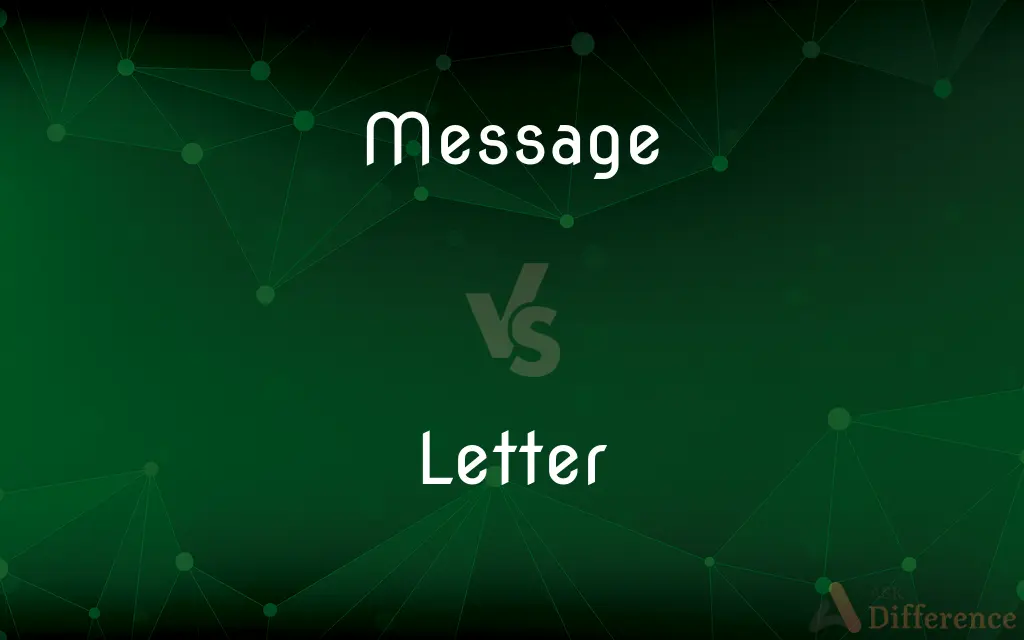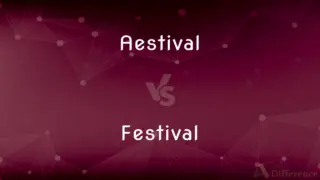Message vs. Letter — What's the Difference?
By Fiza Rafique & Urooj Arif — Updated on March 27, 2024
A message is a broad term for any kind of communication or information transmitted, while a letter is a specific form of written message traditionally sent by mail.

Difference Between Message and Letter
Table of Contents
ADVERTISEMENT
Key Differences
Messages encompass a wide variety of formats, including digital texts, emails, and verbal communications, serving as a general term for any conveyed information. Whereas a letter is traditionally a written form of communication, usually detailed and formal, sent via postal service or hand-delivered.
Messages can be instantaneous, especially in the form of SMS or instant messaging, allowing for real-time communication. On the other hand, letters involve a delivery process, making them more suitable for non-urgent communication.
While messages can be informal and brief, often used for quick exchanges, letters tend to be more structured and formal, sometimes following specific conventions and formats.
Messages, being versatile, can be easily integrated into various digital platforms, facilitating multimedia sharing and group communication. Letters, however, provide a personal touch, often appreciated for their tangible and thoughtful nature in personal or official correspondence.
Messages have evolved with technology, offering features like encryption for privacy and tools for collaboration. Letters, while less versatile in these respects, offer a sense of permanence and physicality that digital messages cannot replicate.
ADVERTISEMENT
Comparison Chart
Medium
Digital or verbal
Written, typically on paper
Speed
Instant to minutes
Days, depending on postal service
Formality
Can vary from informal to formal
Generally more formal and structured
Privacy
Encryption possible in digital forms
Physical privacy, can be sealed
Purpose
Quick communication, casual or urgent info
Detailed communication, often official or personal
Compare with Definitions
Message
Any form of communication transmitted between parties.
She received a message on her phone.
Letter
A written message addressed to a person or organization.
She wrote a letter of complaint to the company.
Message
An implicit meaning or moral conveyed by a story or event.
The film’s message was one of perseverance.
Letter
A formal method of communication, often mailed.
He received a letter from an old friend.
Message
A short piece of information sent digitally.
He sent a quick message to confirm the meeting time.
Letter
A precise written statement, often requiring a response.
The lawyer drafted a letter regarding the contract.
Message
A verbal, written, or recorded communication sent to someone.
The president delivered a message of hope.
Letter
A character representing one or more of the sounds used in speech; any of the alphabetic characters.
The letter “B” starts the word “book”.
Message
Communication through expressions or gestures.
His stern look sent a clear message.
Letter
An award or symbol of recognition in athletics, often worn on a sweater.
She earned a letter in track and field.
Message
A message is a discrete unit of communication intended by the source for consumption by some recipient or group of recipients. A message may be delivered by various means, including courier, telegraphy, carrier pigeon and electronic bus.
Letter
A character representing one or more of the sounds used in speech; any of the symbols of an alphabet
A capital letter
Message
A verbal, written, or recorded communication sent to or left for a recipient who cannot be contacted directly
If I'm not there leave a message on the answerphone
Letter
A written, typed, or printed communication, sent in an envelope by post or messenger
He sent a letter to Mrs Falconer
Message
A significant political, social, or moral point that is being conveyed by a film, speech, etc.
A campaign to get the message about home security across
Letter
The precise terms of a statement or requirement; the strict verbal interpretation
We must keep the spirit of the law as well as the letter
The officer in the incident got in trouble for following the letter of the law
Message
An errand
He would run those interminable messages after school to the bookie
Letter
Literature
The world of letters
Message
Send a message to (someone), especially by email
I was messaged by a Californian contact for some information
The software package incorporates messaging, scheduling, and workflow functions
Letter
A style of typeface.
Message
A usually short communication transmitted by words, signals, or other means from one person, station, or group to another
I found the message you left at my desk. She sent me a quick message by email.
Letter
Inscribe letters or writing on
Her name was lettered in gold
Message
The substance of such a communication; the point or points conveyed
Gestured to a waiter, who got the message and brought the bill.
Letter
Be given a school or college initial as a mark of proficiency in sport
In high school she lettered in soccer, basketball and softball
Message
A statement made or read before a gathering
A retiring coach's farewell message.
Letter
A written symbol or character representing a speech sound and being a component of an alphabet.
Message
A basic thesis or lesson; a moral
A play with a message.
Letter
A written symbol or character used in the graphemic representation of a word, such as the h in Thames. See Note at Thames.
Message
To send a message to.
Letter
A written or printed communication directed to a person or organization.
Message
To send as a message
Messaged the report by cable.
Letter
Often letters A certified document granting rights to its bearer.
Message
To send a message; communicate.
Letter
Literal meaning
Had to adhere to the letter of the law.
Message
A communication, or what is communicated; any concept or information conveyed.
We've just received an urgent message from the President.
Letter
Literary culture; belles-lettres.
Message
An underlying theme or conclusion to be drawn from something.
The main message of the novel is that time heals all wounds.
Letter
Learning or knowledge, especially of literature.
Message
An errand.
Letter
Literature or writing as a profession.
Message
See groceries, shopping.
Letter
A piece of type that prints a single character.
Message
To send a message to; to transmit a message to, e.g. as text via a cell phone.
Just message me for directions.
I messaged her about the concert.
Letter
A specific style of type.
Message
To send (something) as a message; usually refers to electronic messaging.
She messaged me the information yesterday.
Please message the final report by fax.
Letter
The characters in one style of type.
Message
(intransitive) To send a message or messages; to be capable of sending messages.
We've implemented a new messaging service.
The runaway computer program was messaging non-stop.
Letter
An emblem in the shape of the initial of a school awarded for outstanding performance, especially in varsity athletics.
Message
(obsolete) To bear as a message.
Letter
To write letters on
Lettered the paper.
Message
Any notice, word, or communication, written or verbal, sent from one person to another.
Ehud said, I have a message from God unto thee.
Letter
To write in letters
Lettered our name on the mailbox.
Message
Hence, specifically, an official communication, not made in person, but delivered by a messenger; as, the President's message.
Letter
To write or form letters.
Message
A messenger.
Letter
To earn a school letter, as for outstanding athletic achievement
She lettered in three collegiate sports.
Message
To bear as a message.
Letter
A symbol in an alphabet.
There are twenty-six letters in the English alphabet.
Message
A communication (usually brief) that is written or spoken or signaled;
He sent a three-word message
Letter
A written or printed communication, generally longer and more formal than a note.
I wrote a letter to my sister about my life.
Message
What a communication that is about something is about
Letter
The literal meaning of something, as distinguished from its intended and remoter meaning (the spirit).
Message
Send a message to;
She messaged the committee
Letter
Literature.
Benjamin Franklin was multiskilled – a scientist, politician and a man of letters.
Message
Send as a message;
She messaged the final report by fax
Letter
(law) A division unit of a piece of law marked by a letter of the alphabet.
Letter (b) constitutes an exception to this provision.
Message
Send a message;
There is no messaging service at this company
Letter
A size of paper, 8½ in × 11 in (215.9 mm × 279.4 mm, US paper sizes rounded to the nearest 5 mm).
Letter
A size of paper, 215 mm × 280 mm.
Letter
Clipping of varsity letter
Letter
A single type; type, collectively; a style of type.
Letter
(archaic) One who retards or hinders.
Letter
(transitive) To print, inscribe, or paint letters on something.
Letter
To earn a varsity letter (award).
Letter
One who lets or permits; one who lets anything for hire.
Letter
One who retards or hinders.
Letter
A mark or character used as the representative of a sound, or of an articulation of the human organs of speech; a first element of written language.
And a superscription also was written over him in letters of Greek, and Latin, and Hebrew.
Letter
A written or printed communication; a message expressed in intelligible characters on something adapted to conveyance, as paper, parchment, etc.; an epistle.
The style of letters ought to be free, easy, and natural.
Letter
A writing; an inscription.
None could expound what this letter meant.
Letter
Verbal expression; literal statement or meaning; exact signification or requirement.
We must observe the letter of the law, without doing violence to the reason of the law and the intention of the lawgiver.
I broke the letter of it to keep the sense.
Letter
A single type; type, collectively; a style of type.
Under these buildings . . . was the king's printing house, and that famous letter so much esteemed.
Letter
Learning; erudition; as, a man of letters.
Letter
A letter; an epistle.
Letter
A telegram longer than an ordinary message sent at rates lower than the standard message rate in consideration of its being sent and delivered subject to priority in service of regular messages. Such telegrams are called by the Western Union Company day letters, or night letters according to the time of sending, and by The Postal Telegraph Company day lettergrams, or night lettergrams.
A strange lock that opens with AMEN.
Letter
To impress with letters; to mark with letters or words; as, a book gilt and lettered.
Letter
A written message addressed to a person or organization;
Mailed an indignant letter to the editor
Letter
The conventional characters of the alphabet used to represent speech;
His grandmother taught him his letters
Letter
A strictly literal interpretation (as distinct from the intention);
He followed instructions to the letter
He obeyed the letter of the law
Letter
An award earned by participation in a school sport;
He won letters in three sports
Letter
Owner who lets another person use something (housing usually) for hire
Letter
Win an athletic letter
Letter
Set down or print with letters
Letter
Mark letters on or mark with letters
Common Curiosities
What is a letter?
A letter is a written form of communication that is usually sent by mail and is more formal and detailed.
What makes a letter different from a digital message?
A letter is tangible and often conveys a more personal or formal touch, whereas digital messages are quick and versatile.
How are messages and letters transmitted?
Messages can be transmitted digitally or verbally, while letters are usually sent via postal services.
How does the speed of delivery compare between messages and letters?
Messages can be delivered almost instantaneously, while letters require days, depending on postal services.
Can messages be formal?
Yes, messages can be formal, especially in professional or official digital communications.
Can a message be non-verbal?
Yes, messages can be conveyed through non-verbal means, such as gestures or facial expressions.
What is a message?
A message is any form of communicated information, which can be digital, verbal, or non-verbal.
How has technology affected the use of messages and letters?
Technology has greatly increased the use and speed of messages, making letters less common for everyday communication.
Can a message include multimedia?
Yes, digital messages can include multimedia such as images, videos, and links.
Is privacy more secure in messages or letters?
Digital messages can be encrypted for privacy, whereas letters offer physical privacy but can be subject to tampering.
Are letters outdated?
Letters are less common in everyday communication but remain significant in formal, legal, and personal contexts.
What is the typical purpose of a letter?
The purpose of a letter can range from personal correspondence to official matters requiring detailed communication.
Can letters be considered as evidence?
Yes, letters can serve as legal documents or evidence in various contexts.
How do cultural perceptions of messages and letters vary?
Cultural perceptions can vary widely, with some cultures valuing the tradition and personal touch of letters, while others prioritize the efficiency and versatility of digital messages.
What are the emotional implications of receiving a letter compared to a message?
Receiving a letter can evoke a sense of nostalgia and personal connection, while messages are often seen as more routine.
Share Your Discovery

Previous Comparison
Aestival vs. Festival
Next Comparison
Delinquent vs. CriminalAuthor Spotlight
Written by
Fiza RafiqueFiza Rafique is a skilled content writer at AskDifference.com, where she meticulously refines and enhances written pieces. Drawing from her vast editorial expertise, Fiza ensures clarity, accuracy, and precision in every article. Passionate about language, she continually seeks to elevate the quality of content for readers worldwide.
Co-written by
Urooj ArifUrooj is a skilled content writer at Ask Difference, known for her exceptional ability to simplify complex topics into engaging and informative content. With a passion for research and a flair for clear, concise writing, she consistently delivers articles that resonate with our diverse audience.















































